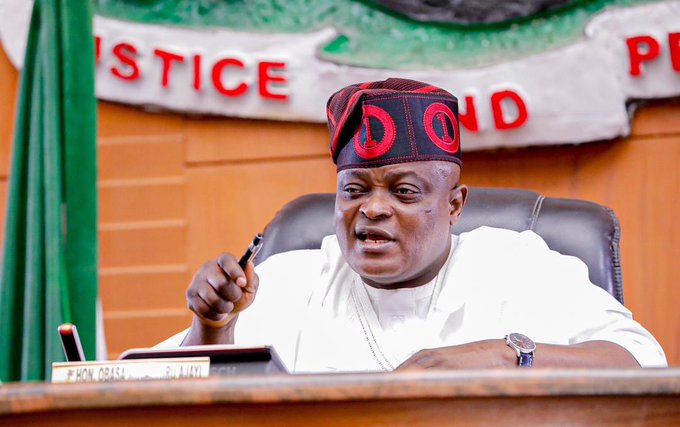On Monday, February 17, 2025, the Lagos State House of Assembly in Alausa, Ikeja, witnessed an intensified security presence as former Speaker Mudashiru Obasa attempted to reclaim his position following his impeachment last month. Personnel from the Department of State Security (DSS) and the Nigeria Police Force were observed patrolling the Assembly premises from as early as 10:00 am, creating an atmosphere of heightened tension.
Current Speaker Mojisola Meranda arrived with her convoy at approximately 11:15 am. While the House did not convene for its regular session, lawmakers were seen engaging in discussions within the complex, likely addressing the unfolding situation.
The increased security measures are believed to be in response to Obasa’s declared intention to return to the Assembly and contest the legitimacy of his removal. On January 13, 2025, Obasa was impeached by 36 out of 40 lawmakers over allegations of gross misconduct and abuse of office. Mojisola Meranda, who had been serving as Deputy Speaker since June 2023, was subsequently elected as the new Speaker, marking a historic moment as the first female to hold the position in Lagos State. Meranda, born on August 16, 1980, has represented Apapa Constituency I since June 2015 and has held various significant roles within the Assembly. citeturn0search0
Obasa, however, has consistently challenged the legality of his impeachment. In a statement during a welcome event organized by supporters from Agege, Alimosho, and Kosofe local government areas in Ikeja GRA, he asserted, “I remain the Speaker as due process was not followed in my removal.” He further emphasized his commitment to constitutional procedures, stating, “If you want to remove [the Speaker], you must ensure you follow the rules. I am not afraid of being removed… What I’m saying: if you want to do that, do it constitutionally.” citeturn0search1
To reinforce his stance, Obasa filed an urgent lawsuit on February 12, 2025, at the Ikeja Division of the Lagos State High Court. Represented by his legal counsel, Chief Afolabi Fashanu (SAN), Obasa is seeking an expedited hearing, requesting the court to mandate the defendants to respond within seven days. The crux of his argument is that his impeachment contravened both the 1999 Constitution (as amended) and the Assembly’s Standing Orders, particularly highlighting that no session should occur without the Speaker’s formal convening of the House.
The political landscape within the Lagos State House of Assembly has been turbulent since Obasa’s impeachment. Reports indicate that Obasa sought intervention from President Bola Tinubu to annul his removal. During a meeting involving key stakeholders, including Governor Babajide Sanwo-Olu and members of the All Progressives Congress (APC), Obasa contended that his impeachment should be invalidated due to procedural irregularities, such as the use of an unofficial mace during the session that led to his ousting. However, this argument was refuted by lawmakers who confirmed that the mace used was from the old Assembly building. citeturn0search1
In the wake of these events, Speaker Meranda has maintained her position, focusing on legislative duties and the stability of the House. Her ascent to the role of Speaker is a culmination of a dedicated political career. Starting as a personal assistant in various governmental departments, she advanced to roles such as the senior special assistant on Intervention and Inter-Governmental Relations in Apapa Local Government and supervisor for Health in the same jurisdiction. Her legislative journey began in 2015 when she was elected to represent Apapa Constituency I. Throughout her tenure, she has chaired several committees, including those on Women Affairs and Poverty Alleviation (WAPA) and Establishment, Training, Pension, and Public Service. citeturn0search0
As tensions escalate, the Assembly’s operations face potential disruptions. The legal battle initiated by Obasa adds a layer of complexity to the situation, with the court’s forthcoming decisions poised to influence the Assembly’s leadership dynamics. Stakeholders and observers are keenly monitoring the developments, recognizing the implications for legislative governance and political stability in Lagos State.
The unfolding scenario underscores the intricate interplay between legal frameworks, political ambitions, and procedural adherence within legislative institutions. As the Lagos State House of Assembly navigates this challenging period, the outcomes will likely set precedents for handling internal disputes and leadership challenges in the future.

